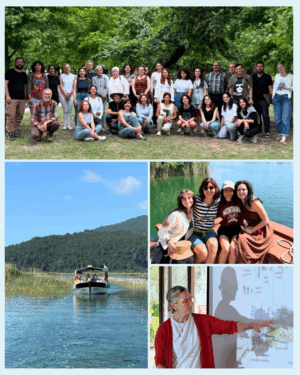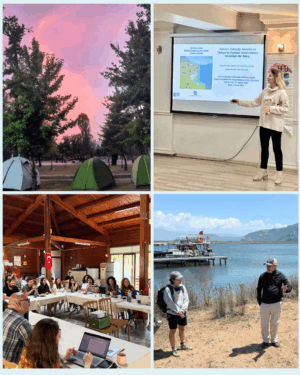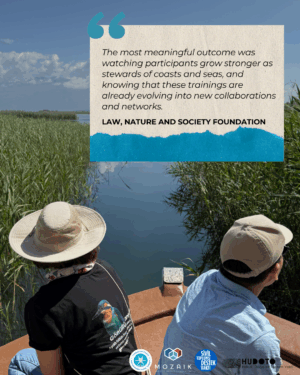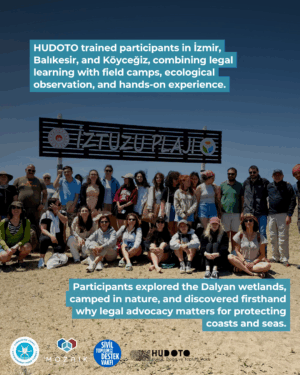Law for Nature: Strengthening Coastal and Marine Protection
The Foundation for Law, Nature, and Society (HUDOTO) was established to strengthen the law as an effective instrument for defending rights, nature, and communities in Türkiye.
With our grant support, HUDOTO carried out the project “Strengthening Legal Capacity for the Protection of Seas and Coasts”, training activists, lawyers, and citizens to use legal frameworks more effectively.
Through workshops, field camps, and hands-on ecological observation, participants not only gained legal knowledge but also directly experienced the ecosystems under threat. HUDOTO’s work shows how combining law, community, and ecology can empower people to protect shared natural resources.
We spoke with Özlem Altıparmak, co-founder of HUDOTO, about the project’s origins, challenges, and impact.
Can you tell us about the mission of your organisation and the work you do?
HUDOTO was born out of the need to use law as a powerful tool for rights advocacy. Many of us had been working as lawyers and legal consultants for a long time, but we wanted our efforts to have greater permanence and impact. That’s why we established HUDOTO as a foundation.
Our aim is to use legal instruments effectively in defending both nature and life. This goes beyond filing lawsuits ourselves — we also want rights holders and civil society organisations to understand and apply legal tools, and to engage in joint legal advocacy. Importantly, we see rights not only through a human-centred lens, but also through the principles of relationality and coexistence.


What problem were you hoping to address when you launched this project?
We observed that rights holders and NGOs often lack sufficient knowledge about the legal frameworks, conventions, and mechanisms available for protecting coasts and seas. Meanwhile, these ecosystems are facing enormous destruction and exploitation. NGOs recognise the problems, but they don’t always know where to apply or which tools they can use.
With this project, our goal was to strengthen the capacity of key actors who play a crucial role in protecting coasts and seas. We aimed to go beyond classroom teaching and bring learning into the field, working with experts from multiple disciplines in a collaborative process of teaching, learning, and experiencing.
What activities did you carry out with TCEF’s grant support, and what challenges did you face?
We organised three main trainings. The first two were workshops in İzmir and Balıkesir, and the third was a camp in Köyceğiz. The camp was particularly impactful: participants not only attended sessions but also explored the İztuzu and Dalyan ecosystems with experts, camped in tents — for some, it was their first time — and experienced learning in close connection with nature.
The level of interest exceeded our expectations, and unfortunately, we could only accept a limited number of participants. This was challenging, because quality and interaction are critical — otherwise, trainings risk turning into lectures rather than genuine exchanges.
Another difficulty was engaging public authorities. Collaboration with the government is essential for protecting coasts and seas; however, the culture of cooperation with civil society is currently limited. Still, we benefited greatly from individual public-sector participants who joined our trainings and shared their perspectives.


Research shows that the climate crisis often deepens gender inequalities. Based on your experience, how do women uniquely respond and develop strategies of resistance?
We often see women at the frontline of struggles against ecological destruction, yet they remain underrepresented in decision-making processes. Across cultures, women’s ties with nature and commons are deep, and this shapes their resistance. Women defend nature as part of themselves, not as a matter of negotiation with authority. This is both empowering for women and critical for society.
Unfortunately, gender equality is often sidelined as secondary in climate discussions, but in reality, the domination of women and of nature are deeply connected. Building an ecological feminist perspective is essential for a just and inclusive response to the climate crisis.
Can you share a story that illustrates the impact of your project?
Many of our participants gained not only legal knowledge but also firsthand experience of ecosystems — something that left a lasting impression. For example, during the Köyceğiz camp, seeing the Dalyan wetlands up close made participants realise that the law is not just for lawyers. It is a civic tool that empowers all citizens to protect their living spaces.
“For us, the most meaningful outcome was watching participants grow stronger as stewards of coasts and seas, and knowing that these trainings are already evolving into new collaborations and networks.”
